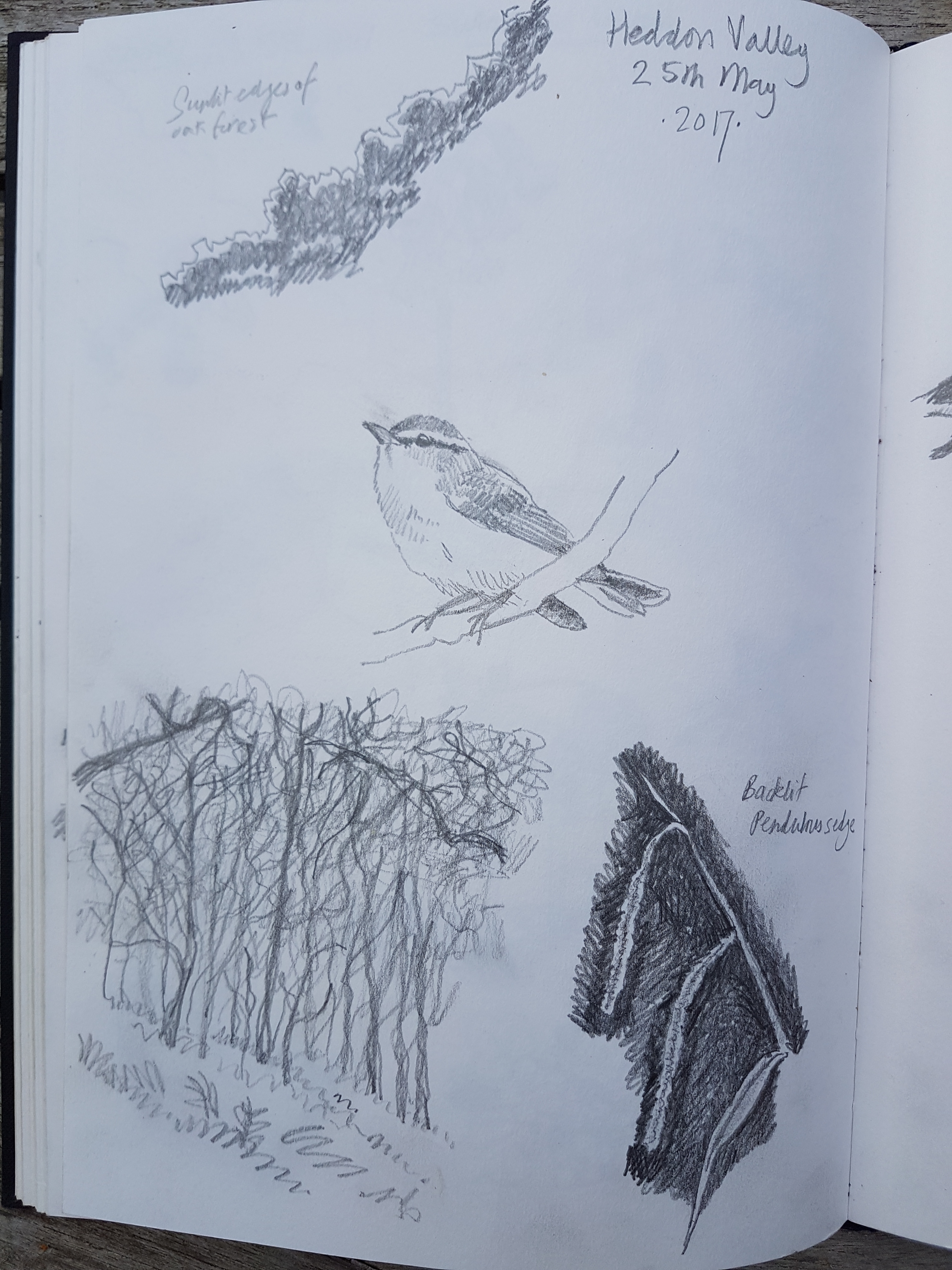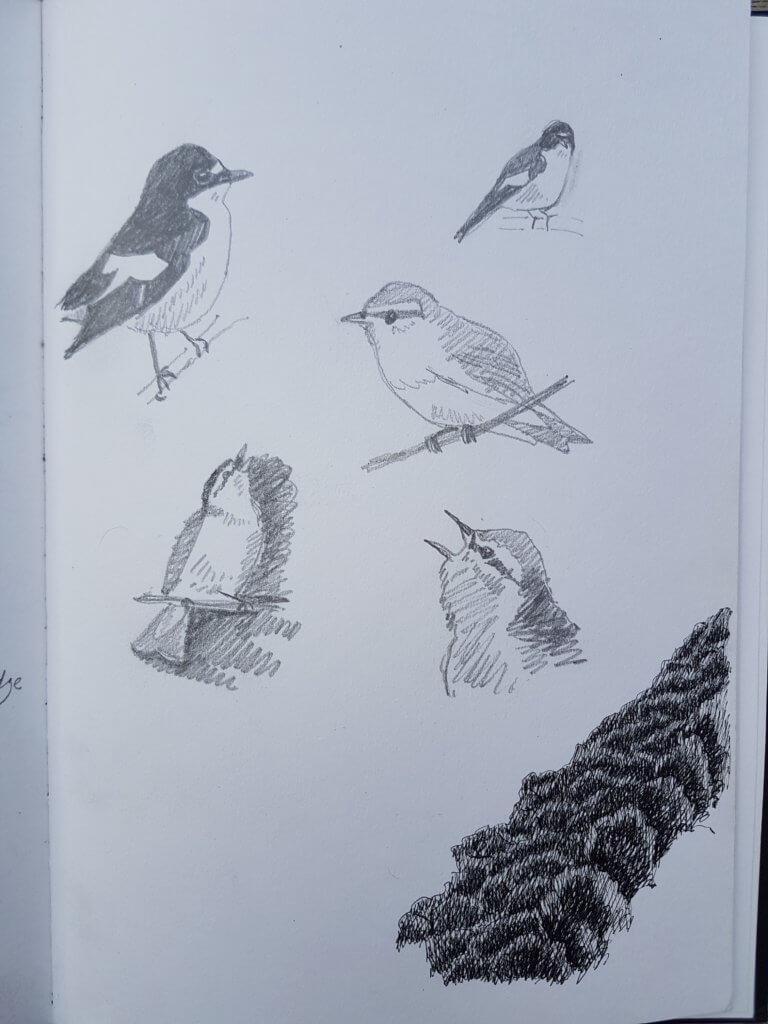Mark writes: the following poem is by Stephen Halton whose Poem for Swifts appeared here in May 2014.
Stephen tells me ‘Two more of my ‘iconic birds’ (as well as Hen Harriers!) are Wood Warblers and Redstarts. Both have sadly disappeared as a breeding species from my part of the world in Bedfordshire but I can remember as a teenager walking miles to the local beech and heathy oak woods at Ashridge to worship at their respective altars when they were still breeding there in the early eighties…
I have had a special attachment to both birds all my life and, last spring, I made a journey to the Exmoor oakwoods where both species still occur in very special and beautiful valley oakwoods along the northern coast. I was enthralled to hear those spirits of the place birds and their songs again and I did several sketches of them. I was also inspired to write a poem about them which came to me, as they always do, rather like chipping away at a rock to reveal the hidden fossil within.‘.
I can remember those Exmoor oakwoods from my youth but the sound of a Wood Warbler always takes me back to Welsh oakwoods, particularly that of the RSPB nature reserve at the Dinas in mid-Wales. One visit there was described by Michael McCarthy in his book ‘Say Goodbye to the Cuckoo‘. It’s time to go out and look and listen in those western oakwoods.
Stitching The Western Oakwoods: The Green and the Red
North Devon,
The Exmoor hills and valleys,
Western oakwoods smirring the slopes,
A warm summer’s evening,
Air shimmers and glitters,
Off freshly unfurled, pale oak leaves,
Everything haloed and backlit
Into
A storm of jewels,
Insects fuzzy against dark hillside,
Flying sparks of light,
Whilst caterpillars’ silk,
Tautly,
Stretches from leaf to leaf,
Like finest silver thread.
Then a faint shimmering,
Distantly heard,
Echoing off leaves,
And tremulously stitching,
And shivering,
Fusing the soundscape together:
A wood warbler sings,
Stitching and dappling,
The light.
And spins.
Its magic,
Of ocean-shallow,
Sea-green light,
Through layers of leaves,
Threading the one to the other.
Then a rich staccato of sound,
A rock in the stream,
And,
In the distance,
A redstart,
Sings its all too-brief song,
A mechanical stutter,
A promise never fulfilled,
As red-gold smoulders,
And lights a fire,
But cannot quench,
The pale yellow and green,
Of the wood warbler,
In its gold-flecked, leafy light,
Of a million,
Glittering,
Oak leaves,
On a Devon hillside,
Sweeping down to a sapphire,
Blue sea.
Steve Halton
May 2017
[email protected]


As I understand it the reasons for the disappearance of these birds from places like Bedfordshire are not definitively understood, but agricultural intensification, invertebrate declines and the fragmentation and loss of woodland are likely to have been key drivers, while the use of our countryside for intensive rearing of game birds may also have had an effect. What is certain is that their loss stands as a sad testament to our efforts to act as stewards of our natural heritage for the next generation. For our children this eroded and diminished landscape is the new norm. Should we be surprised at growing apathy towards the rural environment in an urbanised youth, when what we offer is increasingly impoverished and uninspiring? Our green and pleasant land is increasingly mean and pheasant bland. There is growing awareness of plastic pollution after the Blue Planet epiphany. We need a Blue Planet moment for our countryside, with people becoming as outraged by irresponsible land use as they are by single use plastics.
Too many deer also have an impact in our part of England. Local woods are browsed bare to head height and look totally different to places where I’ve seen wood warblers in Wales or Scotland.
Lyn – yes, Wytham Wood looks very different from when I walked around it over 35 years ago.
The deer in Wytham are culled, now.
Hugh – well said. Many trans-Saharan migrants have declined in numbers, and it’s probably for a range of reasons on their breeding grounds and wintering areas.
But the Wood Warbler is an interesting example of a species which has not advanced its arrival date in the UK very much over the last 30 years. There is good evidence that insect emergences have advanced in the northern hemisphere because of climate change. Those species which have ‘managed’ to come back to the UK earlier haven’t done as badly as those who seem ‘unable’ to get back quicker. So it may be that some of these long distance migrants, who return to these latitudes to cash in on lots of insects are now missing that peak insect abundance.
And then, as Lyn has commented, there are those pesky deer too. Not many deer in Wales though…